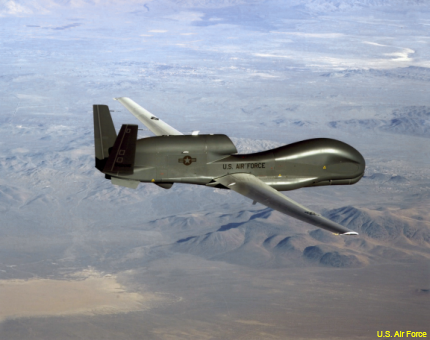US approves sale of Global Hawks to Japan
The State Department has OK’d the possible sale of three of the high-altitude, long-endurance unmanned aircraft, to be used for ISR.

In the latest iteration of a partnership that has lately included cybersecurity and military agreements, the State Department has approved the possible sale of RQ-4 Block 30 high-altitude, long-endurance Global Hawks to Japan.
In the notice – announced by the Defense Security Cooperation Agency, which provided the necessary certification to Congress on Nov. 19 – Japan requested three Block 30 Global Hawk unmanned aircraft with Enhanced Integrated Sensor Suites, eight Kearfott Inertial Navigation System/Global Positioning System units and eight LN-251 INS/GPS units.
According to the Air Force’s “RPA Vector: Vision and Enabling Concepts 2013-2038” document, released in 2014, “The Block 30 system provides a multi-intelligence collection capability through a combination of electro-optical/infrared (EO/IR) and synthetic aperture radar (SAR) imagery and a signals intelligence (SIGINT) payload.”
The total estimated value of Japan’s request is $1.2 billion, which also includes operational-level sensor and aircraft test equipment, ground support equipment, operational flight test support, communications equipment, spare and repair parts, personnel training, publications and technical data, U.S. Government and contractor technical and logistics support services, and other related elements of logistics support, the notice said.
“The proposed sale of the RQ-4 will significantly enhance Japan’s intelligence, surveillance, and reconnaissance (ISR) capabilities and help ensure that Japan is able to continue to monitor and deter regional threats. The Japan Air Self Defense Force (JASDF) will have no difficulty absorbing these systems into its armed forces,” according to DSCA’s announcement.
The U.S. has provided other Asian partners with Global Hawks in the past as well, including South Korea in 2012.
While these systems are used exclusively for ISR, the U.S. has moved to approve the transfer of armed unmanned systems to allies. Earlier this month, the State Department approved the potential sale of MQ-9 Reapers to Italy, making it the second NATO partner, in addition to the UK, to operate the dual ISR/weaponized unmanned aerial vehicles.
Italy requested the sale transfer to support NATO and coalition operations, to increase its operational flexibility and to better protect Italian forces.
Regarding Japan’s request and the State Department’s approval, DSCA said, “This notice of a potential sale is required by law and does not mean the sale has been concluded.” Congress would have 15 days to block the sale, although that rarely occurs.



